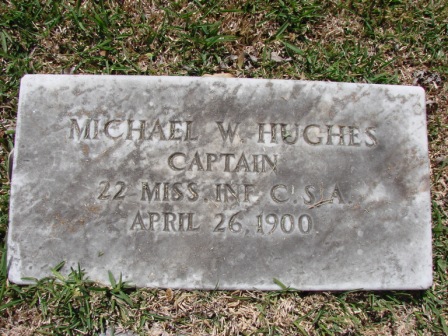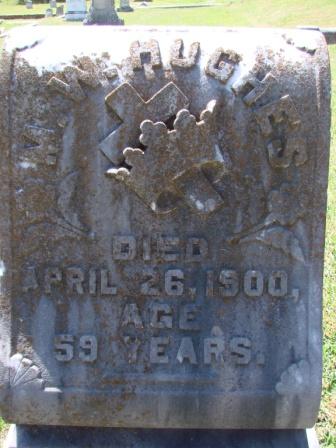|
Known CSA Veterans at
Cedar Hill
Not Forgotten |
||
|
Home
Known CSA Veterans at Cedar Hill
Known CSA Soldiers at Soldiers' Rest |
||
|
|
Michael W. Hughes, Capt.,
b. 1841, Ireland; d. 26 Apr 1900; residence at death was Vicksburg; 22nd Miss. Inf., Co. C; entered as 1st Lt. and
left as Captain. Age 21 years when he enrolled 20 Jun 1861 at Vicksburg and
mustered 27 Jul 1861 at Iuka. Sometime between Jan and May 1862, he was at
Vicksburg, wounded. On 16 Mar 1863, a “Medical Certificate to Retire Invalid
Officer” was issued to M. W. Hughes, suffering from a gunshot wound to his right
lung, which he received at Atlanta, while on duty with his company. This wound
results in frequent hemorrhaging and “consolidation of lung”; the ball was not
removed; the disability was considered permanent; and Capt. Hughes was
considered unable to perform his post duties. Following that, May through Aug
1863, he had “special duty.” On 18 Mar 1864, Capt. M. W. Hughes of 22nd
Miss. Reg., Co. C, is the subject of a Court Martial; “released from arrest
April 14, 1864 by sentence of Court Marshal [Martial], No. 54.” He was wounded
at Peach Tree Creek, Ga., 20 Jul 1864. On 16, 22, and 25 Mar 1865, he entered
the Way Hospital at Meridian, complaint: “wounded.” He signed a Parole of Honor
at Jackson, Miss., May 1865.
In Cedar Hill Cemetery, Vicksburg, Capt. Hughes has both civilian and military markers, as shown here.
|
|
|
This small biography is from Biograpbical and Historical Memoirs of Mississippi (Vol. I), The Reprint Company, Publishers, Spartanburg, South Carolina, 1978 (1891), pgs. 977-978. Capt. M. W. Hughes was born in County Tyrone, Ireland, in August, 1841, his parents, Peter and Bridget (Canavan) Hughes, being also born there. Captain Hughes is a brother of Col. Felix Hughes, who was a prominent levee commissioner and contractor, and was killed at Baton Rouge during the Civil war. The Captain's ancestors, on both sides, were farmers. At the age of nine years he was brought to America, and his first permanent home in this country was at Vicksburg, Miss., where he was employed by his brother during the winter on levee work, and in summer attended the common schools of the county until he was sixteen, when his brother sent him to St. Joseph's college at Bardstown, Ky., for the purpose of securing a commercial education, as well as to take a course in civil engineering. His inclinations were toward mathematics, and during the four years that he remained in this institution he made an enviable record for himself. After graduating on the 3d of June, 1861, he returned home, and as his brother Felix was raising a company, he enlisted and was commissioned lieutenant, and took part in the engagements at Belmont, Shiloh, Baton Rouge, Corinth, Champion's Hill, siege of Jackson, Dalton, Resaca, Kenesaw Mountain, and was severely wounded at Peach Tree Creek, being shot through the breast, the bullet lodging near his spine, where he carries it to this day. He was afterward wounded by a fragment of shell, which injured his vocal organs to such an extent that for twelve months he was deprived of the power of speech. Soon after the battle of Shiloh he was promoted to a captaincy, and after his partial recovery from the shell wound he rejoined his regiment at Atlanta, but could not command on account of his lack of voice and was placed on the retired list for sixty days. He was afterward put in command of the railroad at Jackson, being general inspector at the same tie, and there he received a commission from the Confederate secretary of war to organize a company, but only a portion of it was raised, and these men were detailed as scouts and kept General Johnston informed of the movements of the Federals after the fall of Vicksburg. He was at Jackson when the war closed. His company was first organized as the Sarsfield Southrons, after company C, Twenty-second Mississippi, and during his service he was wounded thirteen times. When peace was declared he secured state contracts for levee work in Louisiana and Mississippi, and built levees south of the Arkansas line to Tensas parish, La., among which mat be mentioned the Ashton levee. At one time he had the contract for all the Mississippi levees, and but for the interference of Governor Ames, just as he was in a position to make money, he would have soon been in independent circumstances. That governor recognized the levee board and revoked all outstanding contracts, Hughes & Searles having the contracts for all levees in Bolivar, Washington and Issaquena counties. About 1887 Mr. Hughes retired from levee work and has since been devoting the greater part of his attention to his plantation in Sharkey county, which consists of fur hundred acres, one hundred and fifty being under cultivation, but is also the owner of one hundred acres within one-half mile of Vicksburg, which is destined to make hi a fortune soon as the city is growing rapidly in his direction. His residence is situated on a hill, covered with beautiful shade and ornamental trees, and everything about the place indicates that it is a model Southern home. He has always taken quite an interest in local politics, is supervisor of his district, and socially is an officer in the Knights of St. John society. On the 27th of June, 1887, he was married to Miss Minnie Henry, a daughter of W. P. Henry of Vicksburg, and a native of Ireland. He came to Vicksburg before the war, and for several years was engaged in merchandising. Captain and Mrs. Hughes have one child, a beautiful little daughter, Alberta may. The family are devout members of the Catholic church. Captain Hughes is a nephew of Thomas Canavan, one of the first settlers of Vicksburg. He is quite proud of his brother's war record, and has a large oil painting of him hanging in his parlor, in which he is dressed in the uniform of a Confederate colonel [Captain]. |
||
|
|
||
|
Use back button to return.
|
||
|
|
||

